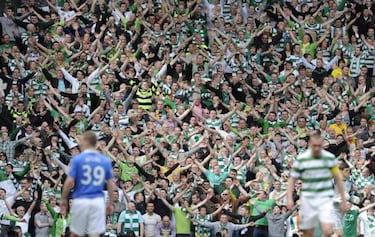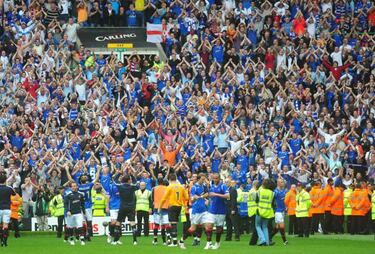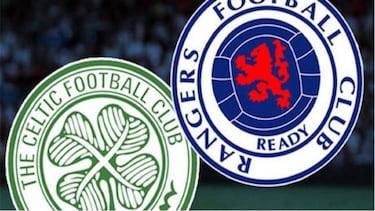The Old Firm derby - sound, fury and sectarianism
Underpinned by ferocious passion, century-old mistrust and sectarian conflict, the sound and fury of the Old Firm derby between Glasgow rivals Celtic and Rangers is unique in modern football.</br><a title="PSG-Celtic live online: UEFA Champions League" href="https://en.as.com/en/2017/11/22/football/1511349219_637862.html">PSG vs Celtic live online</a>

Underpinned by ferocious passion, century-old mistrust and sectarian conflict, the sound and fury of the Old Firm derby between Glasgow rivals Celtic and Rangers is unique in modern football.
'The noise and the passion, there's nothing like it,' said late Rangers star Sandy Jardine. 'I've been fortunate to see derby games all over the world and there is nothing that comes close. When you go out of the tunnel, you get hit by this level of noise which far outweighs normal games or even cup finals.'

Over 50,000 supporters will cram inside Ibrox to see Rangers and Celtic clash for the 404th time on Saturday (13:15 CET), when the winners of 101 of the 120 Scottish league titles go head-to-head. The reason that millions of people around the world will also tune in goes far beyond the battle for supremacy in the Scottish Premiership, with political, cultural and religious differences all playing a part.
But things were not always as intense. When Celtic were founded in 1888, relations between the two clubs were cordial, with Rangers supplying the opposition for their neighbours' first game. 'When the league started, there was a very good relationship between Celtic and Rangers,' Celtic historian and author David Potter told AFP. 'It was only really in the 1920s that a religious element crept in.'
Celtic were founded by a Marist (Catholic) Brother from Ireland and the club's origins were firmly embedded in Irish Catholicism. Andrew Kerins, known as Brother Walfrid, established Celtic with the intention of feeding the impoverished children of Glasgow's east end, where Irish immigrants flocked during the Great Famine of the 1840s.
Rangers became the team of the Scottish Protestant working class almost by accident. 'Within Scottish society there was a feeling there was a need for a club of the traditional Scottish establishment to rival Celtic and it took off from there,' explains Rangers historian Robert McElroy. 'It was more a question of timing than anything else.'
The opening of a massive shipyard in Govan, just a short walk from Rangers' Ibrox home, by industrial firm Harland and Wolff saw an influx of workers arrive from Belfast in the 1910s. The company's infamous 'Catholics need not apply' policy soon spread to the club their workforce adopted.

'That changed the character of Rangers,' says Paul Brennan, editor of the Celtic Quick News website. They specifically stopped employing Catholic footballers at that stage, which made the rivalry become very bitter and ethnic in origin.'
It is not just in religion that the clubs' identities have been built in opposition to each other. In political terms the clubs are at polar opposites as well: Celtic are associated with socialism and Irish Republicanism, Rangers with conservatism and Northern Irish unionism. The signing of former Celtic player Mo Johnstone in 1989 brought Rangers' boycott of Catholic players to an end and the religious tensions between the sides have eased in a more secular society.
But the rise of social media, opposing views over the Scottish independence referendum and Rangers' 2012 liquidation and subsequent four-year hiatus from the top flight have created new divisions. 'If there was no such thing as politics and there was no such thing as religion, I think this game would be the same,' says Craig Houston from Rangers supporters group Club 1872. 'We would find something else to differentiate us.'
Animosity between the clubs' supporters has been all too frequent and a number of murders and violent crimes have been associated with the fixture. 'At the ground, I love it. It has a real edge to it. It's competitive and it's safe,' says Brennan. 'In the city and in the towns and villages around the city, I don't enjoy it at all.'
The game has also attracted Scottish government intervention, with the Offensive Behaviour at Football Act being introduced in 2012 following a particularly volatile Old Firm fixture the previous year. The legislation is aimed at cracking down on sectarianism, but both sides of the Old Firm support have united in their opposition to it.

Related stories
In many ways the clubs have been more allies than rivals off the pitch due to their monopoly of the wealth in Scottish football. Celtic chief executive Peter Lawwell estimated Rangers' four-year absence cost his club £40 million (46.9 million euros). The lack of strong domestic competition, meanwhile, meant Celtic underperformed in Europe.
As Celtic historian Potter admits: 'When Rangers went down a few leagues, I honestly think Celtic missed them.'